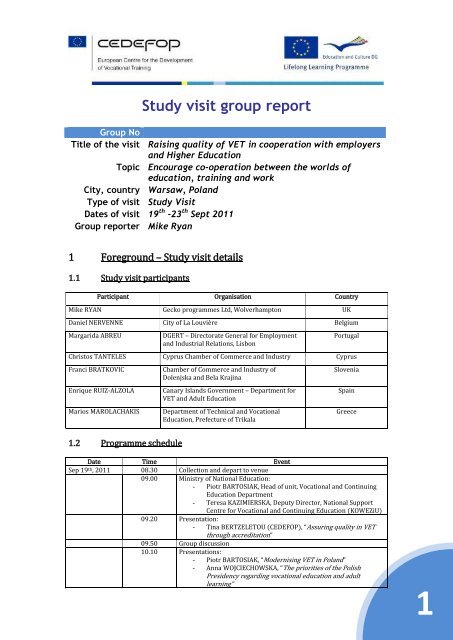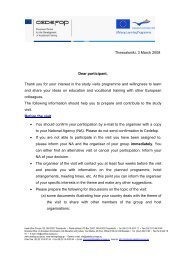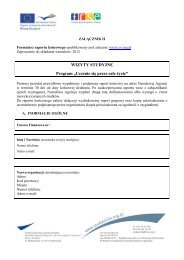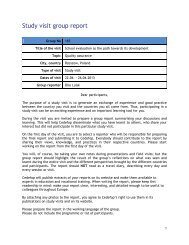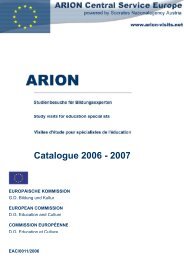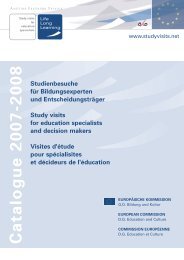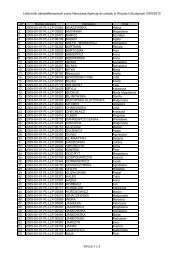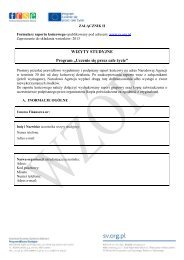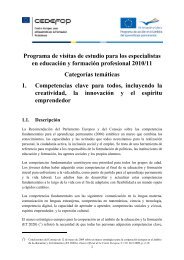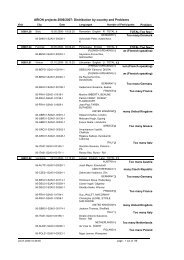1 Study visit group report
1 Study visit group report
1 Study visit group report
Create successful ePaper yourself
Turn your PDF publications into a flip-book with our unique Google optimized e-Paper software.
<strong>Study</strong> <strong>visit</strong> <strong>group</strong> <strong>report</strong><br />
Group No<br />
Title of the <strong>visit</strong> Raising quality of VET in cooperation with employers<br />
and Higher Education<br />
Topic Encourage co-operation between the worlds of<br />
education, training and work<br />
City, country Warsaw, Poland<br />
Type of <strong>visit</strong> <strong>Study</strong> Visit<br />
Dates of <strong>visit</strong> 19 th -23 th Sept 2011<br />
Group <strong>report</strong>er Mike Ryan<br />
1 Foreground – <strong>Study</strong> <strong>visit</strong> details<br />
1.1 <strong>Study</strong> <strong>visit</strong> participants<br />
Participant Organisation Country<br />
Mike RYAN Gecko programmes Ltd, Wolverhampton UK<br />
Daniel NERVENNE City of La Louvière Belgium<br />
Margarida ABREU<br />
DGERT – Directorate General for Employment<br />
and Industrial Relations, Lisbon<br />
Portugal<br />
Christos TANTELES Cyprus Chamber of Commerce and Industry Cyprus<br />
Franci BRATKOVIC<br />
Enrique RUIZ-ALZOLA<br />
Marios MAROLACHAKIS<br />
Chamber of Commerce and Industry of<br />
Dolenjska and Bela Krajina<br />
Canary Islands Government – Department for<br />
VET and Adult Education<br />
Department of Technical and Vocational<br />
Education, Prefecture of Trikala<br />
Slovenia<br />
Spain<br />
Greece<br />
1.2 Programme schedule<br />
Date Time Event<br />
Sep 19 th , 2011 08.30 Collection and depart to venue<br />
09.00 Ministry of National Education:<br />
- Piotr BARTOSIAK, Head of unit, Vocational and Continuing<br />
Education Department<br />
- Teresa KAZIMIERSKA, Deputy Director, National Support<br />
Centre for Vocational and Continuing Education (KOWEZiU)<br />
09.20 Presentation:<br />
- Tina BERTZELETOU (CEDEFOP), “Assuring quality in VET<br />
through accreditation”<br />
09.50 Group discussion<br />
10.10 Presentations:<br />
- Piotr BARTOSIAK, “Modernising VET in Poland”<br />
- Anna WOJCIECHOWSKA, “The priorities of the Polish<br />
Presidency regarding vocational education and adult<br />
learning”<br />
1
Date Time Event<br />
11.00 Presentations:<br />
- Malgorzata CHOJNICKA, “Improvement of vocational<br />
education and training quality – call for proposals and ESFfunded<br />
projects”<br />
- Izabela KACZMARSKA, “Towards excellence and Engagement<br />
in VET – Ministry of Labour and Social Policy’s actions”<br />
12.00 Group discussion<br />
12.30 Presentation:<br />
- Margarida ABREU (Portugal), “Quality assurance in VET –<br />
The certification of VET providers in Portugal”<br />
12.45 Group discussion<br />
13.00 Lunch<br />
14.30 Presentations:<br />
- Teresa KAZIMIERSKA, “Introduction to the National Support<br />
Centre for Vocational and Continuing Education”<br />
- Olga SULKOWSKA, “Activities of the National Support Centre<br />
for Vocational and Continuing Education regarding VET<br />
quality improvement in Poland”<br />
- Mike RYAN (UK), Gecko Programmes Ltd.<br />
15.30 Group discussion<br />
15.45 Transfer to the Old Town<br />
16.00 Social programme<br />
18.00 Group <strong>report</strong> workshop<br />
Sep 20 th , 2011 08.30 Collection and depart to venue<br />
09.00 Warsaw Cultural Education Centre<br />
Welcoming guests:<br />
- Wojciech FELIKSIAK, Director<br />
09.10 Presentations:<br />
- Mieczyslawa NOWOTNIAK, Deputy Director, Warsaw<br />
Department of education, “Development of VET in Warsaw”<br />
- Daniel NERVENNE, Director for development and strategy,<br />
City of La Louvière, Belgium, “VET from the point of view of<br />
economic development: the case of Wallonia”<br />
10.15 Group discussion<br />
11.00 Presentations:<br />
- Slawomir SZOSTAK, Faculty of Electrical and Computer<br />
Engineering, and Pawel NOWAK, Faculty of Civil<br />
Engineering, University of Warsaw, “EU funded projects for<br />
the construction industry: recognition of qualifications and<br />
education quality improvement”<br />
- Tadeusz POPIELAS, Polish Association of Lift and Escalator<br />
Manufacturers, “Staff education programme for the lift and<br />
escalator industry”<br />
- Barbara PUZANSKA, “Necessity of construction trades<br />
education adjustment to labour market needs”<br />
12.00 Group discussion<br />
13.00 Lunch<br />
14.30 Vocational gastronomy school, Warsaw<br />
Welcoming guests:<br />
- Jolanta LITNIEWSKA, Director<br />
- Marzena CIESLAK, Deputy director<br />
14.40 Meeting with school teachers and students<br />
15.30 Group discussion<br />
16.30 Group <strong>report</strong> workshop<br />
Sep 21 st , 2011 08.30 Collection and depart to venue<br />
09.00 Vocational development centre, Warsaw<br />
Welcoming guests and presentations:<br />
- Robert LENART, “The place of the Warsaw Vocational<br />
Development Centre inside and outside school education”<br />
- Andrzej PILAT, “The Association of Vocational Education<br />
Centres”<br />
09.30 Group discussion<br />
10.00 Meeting with teachers and students<br />
11.00 Polish Craft Association<br />
Welcoming guest and presentation:<br />
2
Date Time Event<br />
- Andrzej STEPNIKOWSKI, “The role of craft in vocational<br />
education in relation to labour market needs”<br />
11.30 Group discussion<br />
12.00 Presentation:<br />
- Christos TANTELES (Cyprus), “VET in Cyprus and Quality<br />
assurance”<br />
12.15 Group discussion<br />
12.45 Lunch<br />
14.00 Copernicus Science Centre<br />
17.45 Group <strong>report</strong> workshop<br />
Sep 22 nd , 2011 08.30 Collection and depart to venue<br />
09.00 Voluntary Labour Corps, Warsaw<br />
Welcoming guest and presentation:<br />
- Urszula KOWALSKA, Director, “Voluntary Labour Corps<br />
experiences in the field of vocational education and other<br />
labour market services”<br />
09.30 Group discussion<br />
09.45 Presentation:<br />
- Marios MAROLACHAKIS (Greece), “IVET and CVET in<br />
Greece”<br />
10.00 Group discussion<br />
11.00 Polish Confederation of Private Employers (LEWIATAN)<br />
Welcoming guests and presentations:<br />
- Piotr SARNECKI, “Co-operation between business and<br />
education in Poland”<br />
- Wieslaw WOJCIK (CORPO), “Case studies in the fashion<br />
industry”<br />
11.45 Group discussion<br />
12.15 Presentation:<br />
- Franci BRATKOVIC (Slovenia), Chamber of Commerce<br />
of Dolenjska and Bela Krajina<br />
12.30 Group discussion<br />
13.00 Lunch<br />
14.30 KOWEZiU<br />
Presentation:<br />
- Enrique RUIZ-ALZOLA (Spain) VET System and policies in<br />
Spain<br />
14.45 Group discussion<br />
15.00 Round table:<br />
- discussion with the host institutions<br />
- evaluation of the study <strong>visit</strong><br />
16.30 Group <strong>report</strong> workshop<br />
Sep 23 rd , 2011 10.00 – 17.30 Conference: “Developing co-operation between VET, higher education<br />
and adult learning in response to the challenge of lifelong learning”<br />
2 Findings<br />
This section summarises the findings of the <strong>group</strong> while <strong>visit</strong>ing host institutions, discussing issues<br />
with the hosts and within the <strong>group</strong>. You will be reflecting on what you learnt every day. But to put<br />
them together and give an overall picture, you need to devote a special session to prepare the final<br />
<strong>report</strong> on the last day of the <strong>visit</strong>.<br />
In this section, it is important that you describe not only things you learnt about the host country<br />
but also what you learnt about the countries represented by <strong>group</strong> members.<br />
One of the objectives of the study <strong>visit</strong>s programme is to exchange examples of good practice among<br />
hosts and participants. Cedefop will select well-described projects/programmes/initiatives and<br />
disseminate them to former participants and a wider public, including potential partners for future<br />
projects. Therefore it is important that you identify and describe all aspects that, in your view,<br />
make these projects/programmes/initiatives successful and worth exploring.<br />
3
2.1 Visiting host institutions<br />
Quality assurance of national occupational standards in VET is an important part<br />
of the Polish strategy to develop and enhance the reputation of qualifications in<br />
this area. This has been done in accordance with European policy and in line<br />
with meeting the skills needs of the key sectors for the nation.<br />
Participants gained an understanding of the Polish reforms of VET and their<br />
plans to implement this by 2012 through a series of presentations focussing on:<br />
agreements between the Ministry of National Education and<br />
employers’ associations;<br />
co-operation between VET schools and higher education<br />
establishments;<br />
development of core curricula and programmes for VET;<br />
funding measures for VET programmes<br />
establishment of vocational qualifications standards and their<br />
influence on VET quality;<br />
organisation of vocational qualifications exams;<br />
implementation of the EQAVET initiative in Poland;<br />
VET promotion;<br />
use of e-learning to increase VET attractiveness.<br />
Participants were warmly welcomed and informed by the following institutions:<br />
Ministry of National Education, Department of Vocational and<br />
Continuing Education;<br />
Ministry of Labour and Social Policy, Department of Labour Market;<br />
National Support Centre for Vocational and Continuing Education;<br />
City of Warsaw, Department of Education and Training;<br />
Warsaw University of Technology, Department of Electrical and<br />
Computer Engineering;<br />
Polish Association of Lift and Escalator Manufacturers;<br />
Polish Association of Construction Industry Employers;<br />
Vocational Gastronomy School, Warsaw;<br />
Vocational Development Centre, Warsaw;<br />
Association of Vocational Education Centres;<br />
Polish Craft Association;<br />
Voluntary Labour Corps;<br />
Polish Confederation of Private Employers (LEWIATAN).<br />
4
2.2 Within the <strong>group</strong><br />
Through dynamic and empathic <strong>group</strong> interaction engaged in experience<br />
sharing.<br />
The composition of the <strong>group</strong> enabled this fruitful process and provided for rich<br />
discussions from the perspectives of both public and private stakeholders.<br />
Some of the topics tackled during the week included presentations of the various<br />
national and/or regional VET situations by the participants:<br />
Margarida ABREU (Portugal) highlighted the VET system reform launched<br />
in 2007 to comply with EU recommendations and aimed at promoting<br />
quality assurance within a new legal framework for education and<br />
training involving the implementation of the National Qualifications<br />
System (SNQ) and the quality certification of VET providers. So far the<br />
reform has largely contributed to increasing VET quality and<br />
guaranteeing proper use of European funding in VET.<br />
Mike RYAN (UK) described the constant change in the state of VET in the<br />
UK. Although quality controls and delivery standards are good, both<br />
changes in the economy and employers’ needs suggest that the entry level<br />
for getting a job with a VET qualification is steadily increasing. The new<br />
demands are for technical level people with good experience. Therefore<br />
the challenge in the UK is for promoting higher VET qualifications and<br />
raising the aspirations of their learners before they start work in order to<br />
improve the reputation of qualifications and meet employers’ needs.<br />
Daniel NERVENNE (Belgium) approached VET from the point of view of<br />
economic development. He analysed the integrated articulation between<br />
the “2.Green Marshall Plan” aimed at boosting Walloon development on<br />
the basis of competitiveness poles and clusters, on the one hand, and both<br />
public and private VET providers, on the other, and focussed the role<br />
played by higher education, in general, and universities, in particular, in<br />
process monitoring and evaluation.<br />
Christos TANTELES (Cyprus) gave a general overview of the VET system<br />
in Cyprus. He put the emphasis on the policy priorities as regards VET and<br />
described the achievements made by the Cyprus Ministry of Education<br />
and Culture in order to improve the quality and attractiveness of<br />
secondary technical and vocational education. He also underlined the<br />
efforts of all major stakeholders, including the Human Resource<br />
Development Authority of Cyprus and social partners, to improve the<br />
quality of vocational training for adults.<br />
Franci BRATKOVIC (Slovenia) introduced the regional Chamber of<br />
Commerce and Industry of Dolenjska in Bela Krajina. He explained the<br />
policy context of VET development in Slovenia and stressed the<br />
importance of skills development through education and training in order<br />
to meet the ongoing challenge of economic moves. Many Slovenian<br />
employers give credit to both formal and informal education and yearly<br />
provide more than fifty hours of education per employee; through the<br />
Chambers local employers and social partners, on the one hand, and<br />
5
educational institutions, on the other, co-operate to develop common<br />
projects involving VET.<br />
Marios MAROLACHAKIS (Greece) explained the structure of the Greek<br />
educational system with emphasis on CVET and IVET. He also illustrated<br />
various ways of co-operation between VET schools and private companies<br />
to increase the learning process at secondary education level.<br />
Enrique RUIZ-ALZOLA (Spain) presented the Spanish VET system and<br />
gave detailed information on the relation between VET providers and<br />
private employers. He also pictured the specific situation of the Canary<br />
Islands.<br />
6
2.3 Good practices learnt during the <strong>visit</strong><br />
Initiative<br />
Country<br />
Implementing<br />
Target<br />
Good practice<br />
Contact person<br />
institution<br />
Language training Poland University of Warsaw Pawel NOWAK<br />
VET learners<br />
Increased mobility<br />
p.nowak@il.pw.edu.pl<br />
Job Guidance subject in all IVET<br />
studies<br />
Spain Ministry of Education Enrique RUIZ<br />
eruialz@gobiernodecanarias.org<br />
VET learners<br />
Better awareness of job market requirements,<br />
opportunities and rights<br />
Mobile Career Advice and<br />
Counselling<br />
Poland Voluntary Labour<br />
Corps<br />
Urszula KOWALSKA<br />
u.kowalska@ohp.pl<br />
VET learners from<br />
remote areas<br />
Better awareness of career and job<br />
opportunities + national dimension<br />
Polish move towards selfsufficiency<br />
Poland National All VET stakeholders Polish employers’ contribution (money, time)<br />
to VET provision reduces dependency on<br />
public funds<br />
Promotion and branding in the<br />
Fashion Industry<br />
Poland LEWIATAN through<br />
CORPO<br />
Wieslaw WOJCIK<br />
wes@corpo.pl<br />
VET learners<br />
Use of famous international employers as<br />
advocate for VET quality<br />
Teacher placement in the<br />
Poland LEWIATAN through Wieslaw WOJCIK<br />
Fashion teachers Better understanding of sector<br />
Fashion Industry<br />
CORPO<br />
wes@corpo.pl<br />
Sector Skills Councils UK National Mike RYAN<br />
mike.ryan@geckoprogrammes.co.u<br />
k<br />
Employer contribution Cyprus National Christos TANTELES<br />
christos@ccci.org.cy<br />
Quality certification of VET<br />
Portugal<br />
providers<br />
Putting VET into perspective:<br />
Integrated co-operation<br />
between competitiveness poles<br />
and VET providers<br />
Belgium<br />
(Wallonia)<br />
DGERT – Directorate<br />
General for<br />
Employment and<br />
Industrial Relations,<br />
Lisbon<br />
Wallonia<br />
Margarida ABREU<br />
margarida.abreu@dgert.mtss.gov.p<br />
t<br />
Daniel NERVENNE<br />
dnervenne@lalouviere.be<br />
Employers<br />
Employers<br />
VET providers<br />
Employers and VET<br />
providers<br />
Employer intervention and quality assurance<br />
of qualifications in specific sectors<br />
Employer have a levy to help fund VET<br />
qualifications<br />
Certification based on results of VET outcomes<br />
Ongoing identification of job market needs and<br />
subsequent rapid adjustment of VET supply<br />
7
2.4 The study <strong>visit</strong>s programme aims to promote and support policy development<br />
and cooperation in lifelong learning. That is why it is important to know what you<br />
learnt about such policies and their implementation during your <strong>visit</strong>. You are<br />
invited to describe your findings concerning the following:<br />
2.4.1 Approaches taken by participating countries (both host and participants)<br />
regarding the theme of the <strong>visit</strong>. Are there any similar approaches/measures in<br />
participating countries What aspects ate similar and why What aspects are<br />
different and why<br />
One of the main points was the need to educate learners in terms of mobility. The use of<br />
language skills would definitely increase the mobility of the learner population and<br />
enhance opportunities for employment across a wider geographical area. Specifically the<br />
Leonardo Da Vinci Programme showed excellent best practice in developing modules to<br />
improve language training. This will have a positive effect in terms of future flexibility<br />
for learners who have developed good commercial European language skills and will<br />
help them into sustainable careers.<br />
Many of the Polish presentations have a consistent theme, the recognition and<br />
consistent observation of standards, this is to ensure that the learner achievements and<br />
their inherent quality are recognised across the EU region and therefore aid mobility.<br />
In the presentations there was a strong emphasis from the host country to make the<br />
reformed standards simpler to understand so to better communicate the benefits to all<br />
stakeholders, especially employers and potential learners.<br />
Will VET learning routes become more attractive as graduate unemployment increases<br />
The presentation by CORPO on the fashion industry showed that although many<br />
countries do have activities to link teachers with their respective industries, few match<br />
the ambition and scope shown in the Polish Fashion sector.<br />
Participants view teachers’ and trainers’ involvement in everyday business like as a true<br />
prerequisite for learners’ successful sustainable insertion.<br />
The Walloon 2.Green Marshall Plan aims at boosting the regional economy on the basis<br />
of competitiveness poles and clusters; it also creates synergy and coherence among all<br />
stakeholders, including local and regional authorities, employers and VET providers.<br />
Participants see in the Walloon strategy an interesting way of speeding up the matching<br />
of supply and demand on the labour market thanks to the integration of VET providers<br />
and higher education institutions into the new economic environment. The Walloon<br />
model could easily be transferred to other European regions, like the West Midlands in<br />
the UK, where declining industries are to be substituted by higher value ones in order to<br />
produce sustainable activities and therefore jobs relying on new skills.<br />
2.4.2 Challenges faced by participating countries (including host) in their efforts to<br />
implement policies related to the theme of the <strong>visit</strong>. What are the challenges<br />
Are they common challenges If so, why If not, why not<br />
What is clear in the rapidly changing European environment is the need for good career<br />
advice and guidance; the options available to learners make such services vital. Up-todate<br />
labour market information is also of vital importance so that both the career<br />
8
guidance and skills provision ensure that the changing market gets the skills it needs in<br />
a timely and efficient manner.<br />
Both the Polish and British presentations illustrated the problems in convincing<br />
employers of the value of VET training. In fact many of the participants suggested that<br />
the perception of VET qualifications amongst the population were that they were for less<br />
able learners and therefore less desirable.<br />
Participants advocate a better and tightened link between labour market information<br />
and the delivery of VET, on the one hand, and between the theoretical and practical<br />
elements of VET education, on the other.<br />
When employers consider international qualifications, reputation can count as much as<br />
accreditation.<br />
Indeed, if the learner or the employer has to pay for VET, how do VET providers<br />
convince them of the value of their learning<br />
The level of pay for trainees in the craft sector in Poland is low but for the employer the<br />
money is reimbursed when the trainee qualifies.<br />
The culture of dependency generated by employers and learners getting heavily<br />
subsidised or even free training through European and other funds is common to many<br />
of the countries. All over Europe VET providers have to develop new ways to generate<br />
sustainable income when the funding becomes less favourable, whilst maintaining<br />
quality and reputation.<br />
Price as the main criteria for obtaining public tenders in Poland is of concern for<br />
providers who are trying to build a reputation on quality whereas in other countries<br />
quality and accreditation tend to be of equal importance as value for money.<br />
Some craft professions are in steep decline while others are booming. This seems to be<br />
delivered irrespective of true labour market needs and is common to many counties. In<br />
Poland, for example, this is the case for the crafts of antique watch and jewellery making<br />
and repair and the textile sector. Also regarding learner demand, brand and image,<br />
hairdressing appears more attractive than the traditional crafts, which had an image of<br />
being kept in families and the skills were handed down through the generations. The<br />
prospect of having to spend five additional years to become a Master Craftsperson is not<br />
appealing to many young people.<br />
In funded projects the discussion did focus on the staging of payments: do providers get<br />
paid for the process or do they only get paid on results If most of the payments are only<br />
given on learner achievement, how do they finance their activity<br />
The Voluntary Labour Corps showed the challenge faced by Poland in confronting the<br />
problem of disadvantaged learners and how to support this with reduced funding<br />
assistance in the future, especially if there continues to be significant demand.<br />
Participants also insisted on the fact that in the future private employers will have to<br />
learn to effectively support VET learners, pay for their development and link this to<br />
increased business performance.<br />
In Cyprus all companies pay a 0.5% levy to a national organisation (HRDA) and in return<br />
get subsidised help for any HRDA approved training and development for their staff.<br />
The use of employer case studies to support increased VET training of staff and the<br />
benefits to the company should be made available.<br />
9
2.4.3 Name and describe effective and innovative solutions you have identified that<br />
participating countries (both host and participants) apply to address the<br />
challenges mentioned in question 2.2. Please mention specific country<br />
examples.<br />
Some of the activities in the Polish projects identified the development of teachers in the<br />
VET sphere to better understand the skills needs of the target employment sectors. This<br />
included use of e-learning modules to allow teachers to refresh their knowledge and<br />
learn at a convenient pace, as well as innovative use of basic games to help people<br />
complete the e-modules.<br />
In other countries there is increasing use of e-learning and more advanced technologies<br />
to create more detailed online learning environments.<br />
In this perspective, higher education institutions, in general, and universities, in<br />
particular, should conduct Saturday lectures with the aim of marketing and rebranding<br />
the opportunities in engineering and technology to attract potential entrants from high<br />
school and counteract the fall in applicants over the last decade.<br />
One key innovation is by all means the use of laboratories to allow potential entrants to<br />
see science and technology in action and get acquainted with the work and its<br />
environment.<br />
Visits of the vocational students to the actual working environment of the areas they are<br />
training for are also valuable.<br />
Participants highly appreciated the accessibility of the Warsaw Cultural Education<br />
Centre to the population to showcase their talents. The Centre has the distinction of<br />
being awarded “Place of Discovering Talent” by the Ministry of National Education.<br />
The existence of a strong link between culture and occupation makes it possible for<br />
young people looking for their future to envisage unexpected careers far away from the<br />
traditional job market and requiring special skills.<br />
Participants also valued the use of creative learning, digital and performing arts to<br />
engage disadvantaged learners and students with mental disabilities - although there<br />
seems to be room for improvement in the scope of delivery of learning to learners with<br />
disabilities.<br />
The innovation shown by the fashion industry as it responds to international demand<br />
witnesses that they are looking to the future and learning the lessons of the past.<br />
2.4.4 Assessment of the transferability of policies and practices. Could any examples<br />
of good practice presented in this <strong>report</strong> be applied and transferred to other<br />
countries If so, why If not, why not<br />
Another key theme was the certification of providers and the continuing quality<br />
assurance of their performance.<br />
The UK system does analyse the financial performance of providers in terms of assessing<br />
their capability; it also assesses management performance.<br />
In Portugal financial and managerial assessment does not generally affect the overall<br />
performance. However most of the countries suggest that the enhanced employability of<br />
the person as a result of the learning is a key aspect of performance.<br />
10
In Poland we have seen excellent examples of networks and strong links between sector<br />
associations, city authorities, VET providers, and the employers.<br />
Specifically the Construction and Lift/Escalators presentations on their sectors showed<br />
good practice supported from Leonardo Da Vinci and other EU funds.<br />
The City of Warsaw showed good practice in career advice and guidance with many<br />
offices across the city in different districts with career counsellors and psychologists<br />
available to young people of any age. This is far more comprehensive and extensive than<br />
many of the study <strong>group</strong>’s countries.<br />
Again the work experience activity that is experienced by the teachers in the fashion<br />
sector is of a quality and realism that would be best practice in any country.<br />
2.5 Creating networks of experts, building partnerships for future projects is another<br />
important objective of the study <strong>visit</strong> programme.<br />
Please state whether and which ideas for future cooperation have evolved during meetings and<br />
discussions.<br />
As participants in previous study <strong>visit</strong>s wrote it, we live in an increasingly global world<br />
where the establishment of networks has become crucial to development and economic<br />
prosperity. Facilitating networks in the form of exchanges, <strong>visit</strong>s, and creative and<br />
innovation engagements is vital to future knowledge advances.<br />
During the Warsaw <strong>visit</strong> each participant could easily identify Polish and/or <strong>group</strong><br />
counterparts with whom networking is not only an opportunity but also a must.<br />
Within the <strong>group</strong> a strong will emerged to continue to work together and to exchange<br />
information and good practices.<br />
2.6 What is the most interesting/useful information that the <strong>group</strong> believes should be<br />
communicated to others To whom, do you think, this information will be of most<br />
interest<br />
Participants consider that the presented achievements and ongoing projects in the<br />
fashion industry involving teachers and trainers and giving them the opportunity to<br />
keep their knowledge and skills up-to-date substantially contribute to bridging the gap<br />
between employers and VET providers.<br />
They also take the view that VET should deserve better co-operation and better<br />
guidance.<br />
In terms of co-operation, all-level VET provision should be integrated into decisional<br />
spheres of local and/or regional interest and recognised as a significant part of the value<br />
creation process if it benefits from both accreditation and credibility.<br />
In terms of guidance, learners’ skills should be duly and objectively assessed before<br />
training, which could enable learners to make objective choices as regards training and<br />
career.<br />
Training opportunities for disabled learners should be increased and improved.<br />
11


